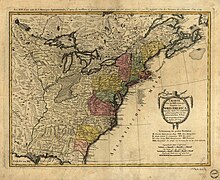User:Plasamas/sandbox
United Colonies | |
|---|---|
| 1775–1777 | |
| Motto: Other traditional mottos:[2]
| |
| Anthem: "The Star-Spangled Banner"[3] | |
 | |
| Capital and largest city | New York City |
| Official languages | None at the federal level[a] |
| National language | English (de facto) |
| Ethnic groups | |
| Religion | None at state level |
| Demonym(s) | American[b][6] |
| Government | Federal presidential constitutional republic |
| Legislature | Congress |
| Senate | |
| House of Representatives | |
| Independence from Great Britain | |
| History | |
| July 4, 1776 | |
• Established | 1775 |
• Disestablished | 1777 |
| Currency | U.S. dollar ($) (USD) |
| Time zone | UTC−4 to −12, +10, +11 |
• Summer (DST) | UTC−4 to −10[c] |
| Date format | mm/dd/yyyy[d] |
| ISO 3166 code | US |
The "United Colonies" was the name used by the Second Continental Congress for the emerging nation comprising the Thirteen Colonies in 1775 and 1776, before and as independence was declared. Continental currency banknotes displayed the name 'The United Colonies' from May, 1775, until February, 1777, and the name was being used as a colloquial phrase to refer to the colonies as a whole before the Second Congress met, although the precise place or date of its origin is unknown.
Founding Father John Adams used the phrase "united colonies" as early as February 27, 1775, in a letter entitled "To the Inhabitants of the Colony of Massachusetts-Bay" published in the Boston Gazette:
They have declared our cause their own—that they never will submit to a precedent in any part of the united colonies, by which Parliament may take away Wharves and other lawful estates, or demolish Charters; for if they do, they have a moral certainty that in the course of a few years, every right of Americans will be taken away, and governors and councils, holding at the will of a Minister, will be the only legislatives, in the colonies.[7][8]
On June 19, 1775, the members of the Second Continental Congress, calling themselves the "delegates of the United Colonies", appointed George Washington the "General and Commander in chief of the Army of the United Colonies".[9] On June 7, 1776, Richard Henry Lee, after receiving instructions and wording from the Fifth Virginia Convention, proposed to Congress that they cut their political ties with England, declare themselves a new nation, and create a constitution. Known as the Lee Resolution, and passed by the delegates on July 2, 1776, it referred to the United Colonies, reading in part:
Resolved, that these United Colonies are, and of right ought to be, free and independent States, that they are absolved from all allegiance to the British Crown, and that all political connection between them and the State of Great Britain is, and ought to be, totally dissolved.
On September 9, 1776, Congress formally dropped the name "United Colonies" in favor of the “United States of America", which had been introduced as the nation's name in the July Declaration of Independence.
References
[edit]- ^ English is the official language of 32 states; English and Hawaiian are both official languages in Hawaii, and English and 20 indigenous languages are official in Alaska. Algonquian, Cherokee, and Sioux are among many other official languages in Native-controlled lands throughout the country. French is a de facto but unofficial language in Maine and Louisiana, while New Mexico law grants Spanish a special status. In five territories, English as well as one or more indigenous languages are official: Spanish in Puerto Rico, Samoan in American Samoa, and Chamorro in both Guam and the Northern Mariana Islands. Carolinian is also an official language in the Northern Mariana Islands.[4][5]
- ^ The historical and informal demonym Yankee has been applied to Americans, New Englanders, or northeasterners since the 18th century.
- ^ Cite error: The named reference
timewas invoked but never defined (see the help page). - ^ See Date and time notation in the United States.
- ^ 36 U.S.C. § 302
- ^ "The Great Seal of the United States" (PDF). U.S. Department of State, Bureau of Public Affairs. 2003. Retrieved February 12, 2020.
- ^ An Act To make The Star-Spangled Banner the national anthem of the United States of America (H.R. 14). 71st United States Congress. March 3, 1931.
- ^ Cobarrubias 1983, p. 195.
- ^ García 2011, p. 167.
- ^ Compton's Pictured Encyclopedia and Fact-index: Ohio. 1963. p. 336.
- ^ "Adams Papers Digital Edition - Massachusetts Historical Society". www.masshist.org. Retrieved 2021-08-25.
- ^ ""To the Inhabitants of the Colony of Massachusetts-Bay."". AAS Catalog Record. 1775-01-23. Retrieved 2021-08-25.
- ^ Founders Online, Commission to George Washington, 19 June 1775



